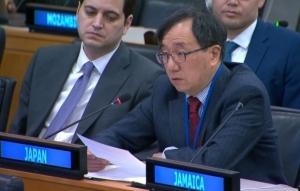Statement by H.E. Ambassador YAMAZAKI Kazuyuki, Permanent Representative of Japan to the United Nations, at the Joint Informal Interactive Dialogue on the 2025 Review of the Peacebuilding Architecture
2025/5/8

I thank the Presidents of the General Assembly and Security Council for hosting this important meeting. I also thank the PBC Chair and the PBAR Co-Facilitators for their remarks and presentations.
In today’s complex international environment with many conflicts around the globe, along with the current severe financial conditions facing the UN and the world, this year's PBAR gives us a timely opportunity. I would like to mention four points which we hope will be reflected in the PBAR resolutions.
First, we need to recognize the importance of smooth transitions from the humanitarian assistance phase to the longer-term development phase in our peacebuilding efforts. Japan believes that the concept of the HDP (Humanitarian-Development-Peace) Nexus is crucial in this regard. The strength of the PBC lies in its ability to engage in all stages of a conflict, from before its outbreak through to its resolution. The Commission’s unique convening power should be fully leveraged for bridging all the actors together while ensuring the HDP Nexus. This convening power should also be supported by Resident Coordinators.
Second, I would like to reiterate the importance of conflict prevention. Ever since the 2016 PBAR resolutions, the importance of prevention has been repeatedly emphasized, including in the Pact for the Future. There is growing understanding that preventing conflict can be far more cost-effective than addressing active conflicts in terms of political, socio-economic and financial costs.
Third, through the activities of the PBC and the PBF over the past 20 years, we have learned that, for sustaining peace and preventing conflicts, institution building and investment in people are of fundamental importance. Any conflict prevention and peacebuilding efforts must be led by national and local governments and people themselves based on an inclusive human-centered approach. These crucial lessons learned through past experience should be duly recognized.
Fourth and finally, in order for the Peacebuilding Architecture to function more effectively and efficiently, the PBC should further reinforce its collaboration with the main UN organs, especially the Security Council and the General Assembly. Coordination between the Security Council and the PBC must be strengthened through more frequent and deeper communication. The Council should utilize the PBC’s convening and advisory power more effectively through improved coordination on its programme of work.
Peacebuilding has long been Japan’s priority area, and we will engage constructively in the upcoming PBAR negotiations.
I thank you.
